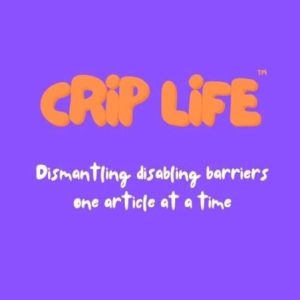Written by Emma Purcell
For many disabled adults who need full-time care, they continue to rely on their parents to carry out some or all of their care due to a lack of social care funding and good quality and safe carers.
With today being Time to Talk Day, guest writer Emma Purcell – who is co-founder of the online disability magazine Crip Life™ and a loyal member of the Spokz People community – shares her personal experience of continuing to rely on her parent’s support and how it impacts her both positively and negatively.
From independent living to dependency on my parents
As a teenager living at an accessible boarding school, I felt free and gained the confidence to live independently with the support of my care team.
Fast forward to 2024 and the reality is so different. I moved into my first house in July 2017 and signed up to a live-in care agency. Within three months, I went through more than 10 different carers. They either couldn’t speak English, had no safety training in manual handling, couldn’t drive my Motability vehicle or were unable to keep my home safe, clean and tidy. By October 2017, my Mum gave up her job and came to live with me full-time.
After several more years of trying to find suitable care, my parents and I made the decision that it was best that I moved back in with them. So in 2021, my parents purchased a bungalow and got it made accessible for me and in June 2022 I moved in.
The challenges of receiving care from my parents
The hardest thing about receiving care from my parents is the guilt I have that they had to give up their jobs, move house again and be limited on what they could do and where they could go.
Also, living with my parents involves a lot of compromise and sacrifice. There is the issue of not having the freedom to get up and go to bed when I please, being able to attend events and visit friends wherever and whenever I like and having less privacy to meet up with new people or do things such as go on dates.
I’ve also turned down many work events because of the time and distance as I know my Mum isn’t confident travelling to unfamiliar, crowded places and doesn’t like frequent late nights.
Some of these issues can also occur with other carers but I feel I have to compromise more with my parents as not only are they my carers, but they are my family and I have to consider their health and wellbeing too. Plus, as an adult, there are just certain events and activities I would prefer not to do with my parents.
My biggest concern is that there will come a time when my parents can no longer care for me and I’m scared of what the future will bring in terms of the kind of care I receive.
The benefits of my parents’ support
On the plus side, having my parent’s support makes everyday tasks less stressful. My Mum knows my care routine, is confident driving my Motability vehicle and helping me drive my wheelchair when out in public, and as she is such a clean freak anyway, I know for a fact she will keep the house, my clothes, and other belongings clean and tidy.
As for my Dad, although he does work full time, when he is around, and Mum is busy, he can support me with personal care in an emergency, drive me places and support me with other tasks when necessary.
In addition, what helps me get through this difficult situation is knowing I’m not alone. I know many other disabled adults who still rely on their parents for care support.
Furthermore, being a member of the Spokz People community allows me to share the challenges I face relying on my parents and helps me combat loneliness by speaking to like-minded people in similar situations.
About Crip Life™

Crip Life™ is an online disability magazine dismantling disabling barriers one article at a time. Launched in May 2023, it was founded by Emma Purcell and Joanna Baker-Rogers, who both have personal experiences of living with a disability.
Since launching over eight months ago, Crip Life™ has published over 80 articles, secured exclusive interviews and collaborated with a dozen companies. It has reached 5K visitors, a combined social media following of 1300 followers and over 200 subscribers to the free monthly newsletter.
Crip Life™ has had the privilege of interviewing famous people such as disabled actors Jack Carroll & Tommy Jessop, blind comedian Chris McCausland, deaf DJ Troi Lee, amputee footballer Shelbée Clarke, disabled cricketer Callum Flynn and inclusive fashion designer Victoria Jenkins.
Emma Purcell, who is Crip Life™’s feature writer and editor, has written several opinion and feature pieces including a review of Rosie Jones’ ableism documentary, a piece discussing whether sports broadcasters are ableist towards disability sports, an article asking why fireworks affect disabled people and content celebrating disabled climate activists.
To browse more content on Crip Life™ and subscribe to the FREE monthly newsletter, visit criplife.co.uk. You can also follow Crip Life™ on Facebook, Twitter, Instagram and LinkedIn.

